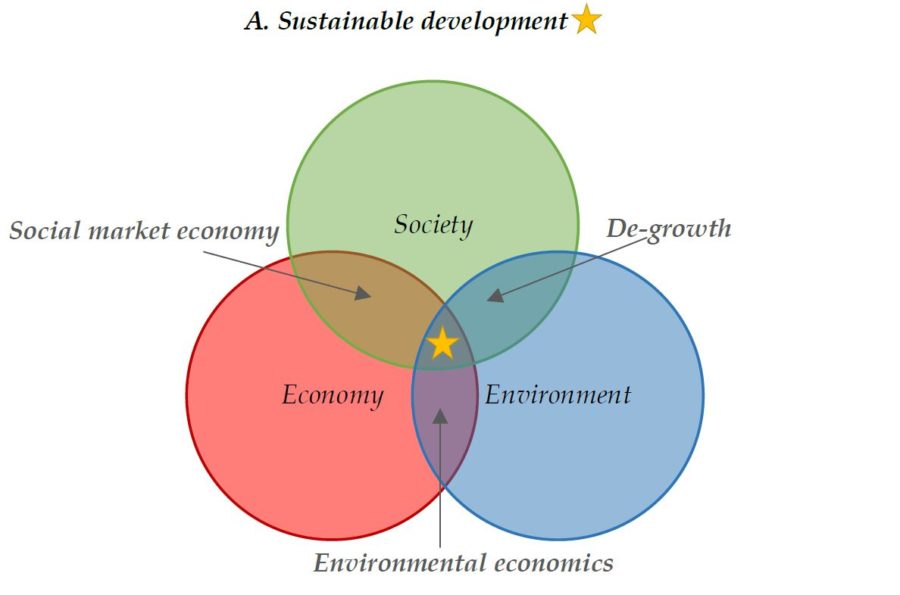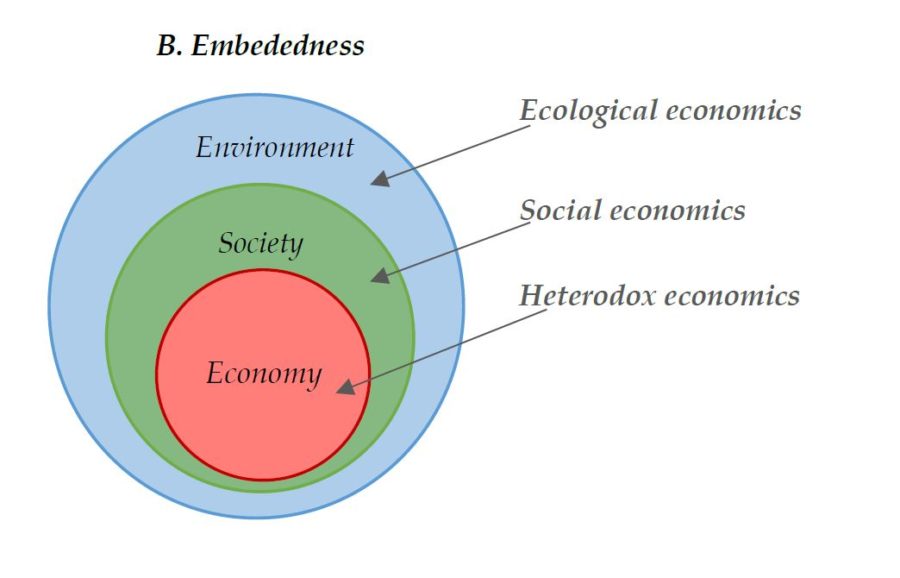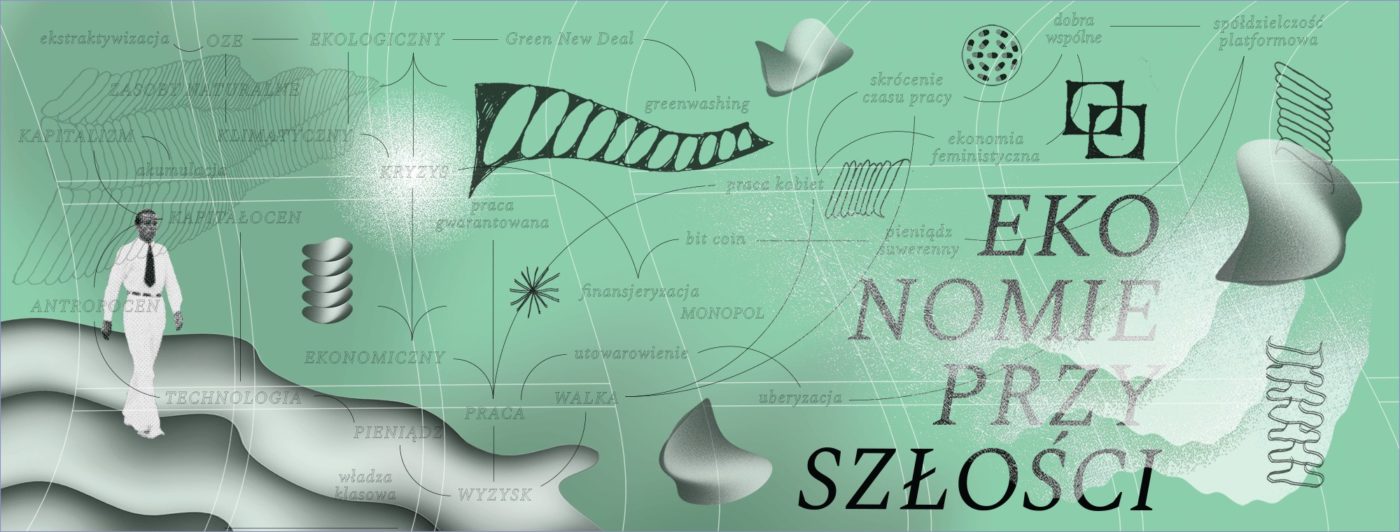Economy, society, or environment – what should be the priority in fighting the crisis?
Hanna Szymborska
As a result of the coronavirus pandemic, the year 2020 will be marked by the most profound economic and healthcare crisis in a century. Furthermore, social unrest intensifies all over the globe, sparked by increasing socio-economic inequalities fuelled by over 40 years of neoliberal policies [1]. On top of that, the beginning of the 21st century has been characterised by an unprecedented environmental crisis, which, without radical and global action, will fundamentally exacerbate the quality of life on Earth in the years to come [2]. Therefore, there is an urgent need to identify what priorities public policy should pursue to effectively address these economic, social, and ecological problems, both during the current pandemic and in the near future. Should governments prioritise investing in the economy, society, or in the environment?
In this context, during the discussion following my lecture organised by Biennale Warszawa as part of the series “Economics of the future” [3], I was asked several pertinent questions:
- what strategic choices should governments make to deal with the post-pandemic crisis: invest in social policy, or in the economic reform?
- should post-crisis policies focus on supporting consumption or investment?
- in what way can economic processes be democratised to contribute to reducing inequalities?
During other debates in the same series we have also discussed the role of the financial sector in society as well as what perspectives for social change are there in light of new technologies, whether we need to abandon the aim of economic growth to effectively tackle inequalities, and why we should rethink the potential limitations of fiscal policies and consider job guarantee as a way to recover from the current crisis.
What all these issues have at their root is the question of how the relationship between the three pillars of our socio-economic life is imagined.
The first pillar is society, i.e. formal and informal rules that organise and govern relationships between individuals, as well as relationships between the members of society and the government. They include social norms, culture, religion, political institutions, as well as law and order. Prosperity and preventing inequalities are principle objectives of public policy related to this pillar.
The second pillar is the economy, i.e. rules organising production and distribution of material goods. Its main objective is the pursuit of economic growth.
The third pillar is the natural environment, which determines access to natural resources that support economic and social life, as well as climate events that impact economic and social processes. The main objective in this case is preventing environmental degradation.
Diagram (A) illustrates how the relationship between these three pillars is commonly perceived in public opinion. According to the diagram, the economy, society, and the environment are viewed as three distinctive planes which overlap in certain situations. The area where social, economic, and environmental objectives overlap corresponds to the concept of sustainable development [4].

To simplify, according to this diagram, the area in which economic activity strives to fulfil objectives related to social life can be related to the idea of the social market economy, in which prosperity and social security are important goals of economic policy (which are not necessarily compatible with environmental protection).
On the other hand, policies that focus on the quality of social life and environmental protection, without taking economic growth into account, correspond to the postulates of the de-growth movement. They call for a reduction in the level of economic production to prevent inequalities and degradation of the natural environment.
It is also possible to conduct an analysis of economic activity and its impact on the natural environment in a way that does not explicitly consider social issues. One example of such an approach are propositions of environmental economics. Environmental economics focuses on a comparative analysis of externalities of economic production in an effort to achieve economic and environmental objectives.
In this situation, sustainable development emerges as an idea that pursues social wellbeing (through reducing inequalities) together with striving for economic growth in a way that deliberately minimises its negative impact on the natural environment.
However, such a outlook on the relationship between the economy, society and the natural environment suggests that sustainable development is only one of numerous policy options. It also implies that it is possible to achieve objectives within one of these three pillars (e.g. economic expansion) without taking into account what happens in the other two planes (society, environment).
In the context of the pandemic, this would mean that governments should be able to invest either in economic recovery or in social programmes, without regard for what the consequences of this choice are for the remaining pillars, for instance, the natural environment. Moreover, the diagram above suggests that various aspects of social policy may be incompatible with economic recovery. Such conviction is widespread among many mainstream economists, who believe that investing in social programmes, e.g. unemployment insurance or childcare benefits, discourages economic agents from work and making effort. This view also leads to a belief that the effects of economic policy can be isolated from what is happening in the social sphere and in the natural environment.
Diagram (B) presents another view of how these three pillars of socio-economic life are related. This approach reflects the notion of embeddedness, introduced by the Hungarian economic historian Karl Polanyi and the American economic sociologist Mark Granovetter [5].

Embeddedness implies that economic activity is always and everywhere limited by non-economic circumstances, both in capitalist and in non-capitalist societies. At the same time, whatever happens in the economy always influences social life and the natural environment. Such deep interrelations between the economy and society lie at the foundation of social economics and heterodox economics (which comprises, among others, old institutional economics, feminist economics, and Post-Keynesian economics). Moreover, ecological economics highlights that the state of the environment determines the ultimate limits of social and economic life.
The idea of embeddedness carries radically different conclusions about the objectives and methods of social and economic policies. It implies that fiscal and monetary policy must not – and cannot – be formulated and implemented separately from social and environmental policies, and vice versa. This view challenges statements of those politicians and economists who claim that investing in economic recovery is more important to deal with the crisis than supporting the social security system. But boosting private sector consumption or investment cannot be effective if we do not take into consideration parallel changes in social policy. This is painfully illustrated by the example of the UK. The country’s productivity problems cannot be understood without considering the negative impact that the decade of austerity has had on the healthcare and social welfare systems.
Furthermore, the economic policy response to the pandemic (the so-called “anti-crisis shield”) cannot exclude the effects on the natural environment. Before the pandemic, there were serious discussions going on regarding how public policies should counteract environmental degradation. Even central banks started to consider the role of the monetary policy in promoting an environmentally friendly financial system [6]. Neglecting environmental issues in the policy response to the coronavirus will hit back our economic and social systems with double force within the next few years. What’s more, the environmental crisis is visible in the background of racial and ethnic inequalities, as people of colour bear a disproportionate burden of climate change [7].
In summary, the current economic crisis is an opportunity to rethink what we value as society. Policy responses to the current crisis will not bring about a lasting economic recovery without simultaneously undertaking measures to prevent the social and the environmental crises from becoming worse. The idea that the economy is fundamentally embedded in social life and in the boundaries of the natural environment can improve our understanding of the relationship between these three pillars of our socio-economic life. This, in turn, can help us address the civilisational challenges we are currently facing in a more effective way. In this context, the “Economics of the future” project, which aimed to broaden the scope of the economic debate in Poland, has turned out to be surprisingly relevant and timely in highlighting the duty of economics towards society and the environment. In the face of the coronavirus pandemic and the Black Lives Matter movement, discussions and conclusions drawn from this series are of global importance.
* * *
[1] Cf. Przemysław Wielgosz, Witajcie w cięższych czasach, Wydawnictwo RM, Warsaw 2020; Siddhant Issar, Listening to Black lives matter: racial capitalism and the critique of neoliberalism, “Contemporary Political Theory” 2020, https://doi.org/10.1057/s41296-020-00399-0 (accessed 25 June 2020).
[2] Anna Sierpińska, 467 klimatycznych zagrożeń dla ludzkości, “Nauka o klimacie”, 17 March 2020, https://naukaoklimacie.pl/aktualnosci/467-klimatycznych-zagrozen-dla-ludzkosci-404 (accessed 25 June 2020). See also: Lancet Countdown: Tracking Progress on Health and Climate Change, https://www.lancetcountdown.org (accessed 8 July 2020).
[3] Post-Keynesian economics for the day after tomorrow, Biennale Warszawa, 2 June 2020; https://biennalewarszawa.pl/en/postkeynesizm-na-pojutrze/ (accessed 25 June 2020).
[4] Resolution adopted by the General Assembly on 25 September 2015 A/RES/70/1, UN, 15 October 2015 https://www.un.org/en/development/desa/population/migration/generalassembly/docs/globalcompact/A_RES_70_1_E.pdf (accessed 3 July 2020).
[5] Kalina Grzesiuk, Zakorzenienie społeczne gospodarki. Koncepcja Marka Granovettera, Wydawnictwo KUL, Lublin 2015. See also: Mark Granovetter, „Economic Action and Social Structure: The Problem of Embeddedness”, American Journal of Sociology, Vol. 91, No. 3 (Nov., 1985), pp. 481-510.
[6] Milena Kabza, ONZ: Banki centralne powinny wesprzeć ochronę środowiska, “ObserwatorFinansowy.pl”, 10 August 2017, www.obserwatorfinansowy.pl/tematyka/rynki-finansowe/bankowosc/onz-banki-centralne-powinny-wesprzec-ochrone-srodowiska/ (accessed 25 June 2020). See also: Rob Macquarie, A Green Bank of England, Positive Money, May 2017, http://positivemoney.org/wp-content/uploads/2018/05/PositiveMoney_AGreenBankofEngland_Web.pdf (accessed 8 July 2020).
[7] Ben Piven, Black Lives Matter protests spotlight environmental racism, „Al Jazeera”, 19 June 2020, www.aljazeera.com/ajimpact/black-lives-matter-protests-spotlight-environmental-racism-200618200615984 (accessed 25 June 2020).
